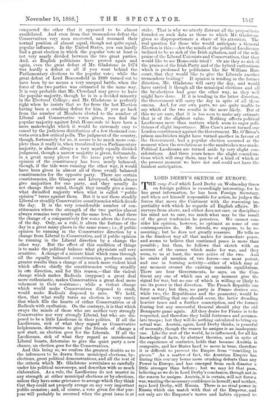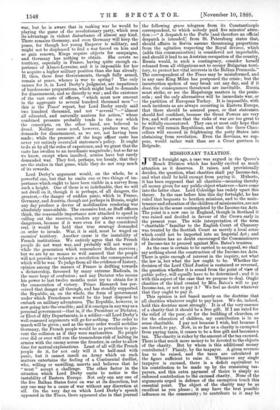LORD DERBY'S SKETCH OF EUROPE. T HE coup d'oeil which Lord
Derby on Wednesday threw on foreign politics is exceedingly interesting, for he has great information, he has been Foreign Secretary, and when not himself responsible for action, he judges the forces that move the Continent with the reasoning im- partiality with which he regards all English affairs. He surveys from above, and either does not care, or disciplines his mind not to care, too much what may be the result of the great tendencies he perceives. We cannot con- sider his opinion, however, so optimist as some of our contemporaries do. He intends, we suppose, to be re- assuring ; but he does not greatly reassure. He tells us in the frankest way all that makes for immediate peace, and seems to believe that continued peace is more than possible ; but then, he follows that sketch with an account of the causes which make for war, and they seem, to us at least, the more active of the two. And he omits all mention of two forces—one most potent, and one in burning activity—either of which may at any moment overset the existing unstable equilibrium. There are four Governments, he says, on the Con- tinent any one of which can at any moment give the signal for war, but no one of which is willing or likely to use its power in that direction. The French Republic can force a war • but then, no party in France desires one, while two, die Republicans and the peasantry, would be most unwilling that one should occur, the latter dreading heavier taxes and a further conscription, and the former fearing lest any successful General should play the old Bonaparte game again. All they desire for France is tobe respected, and therefore they build fortresses and accumu- late troops ; but they will do nothing calculated to bring on actual war. Austria, again, Lord Derby thinks, is peaceful of necessity, though the reason he assigns is an inadequate one. Like the rest of the world, he is influenced, for all his knowledge of facts, by abstract theories, and in spite of the experience of centuries, holds that because Austria is composite, and her States hard to move in tune, therefore it is difficult -to prevent the Empire from "tumbling in pieces." As a matter of fact, the Austrian Empire has during this century borne more crushing-defeats than any Power in Europe, and has emerged from each disaster a little stronger than before ; but we may let that pass, believing as we do in Lord Derby's conclusion, though not in the reason he assigns. Austria, it is certain, will not force a war, wanting thenecessary confidence in herself; and neither, says Lord Derby, will Russia. There is no rival power in Russia which can match with that of the Emperor, and not only are the Emperor's tastes and habits opposed to war, but he is aware that in making war he would be playing the game of the revolutionary party, which sees its advantage in violent disturbance of almost any kind. There remains Germany, and even Germany will keep the peace, for though her young Emperor is military, and might not be displeased to find a war forced on him and so gain renown, Kings require objects for campaigns, and Germany has nothing to obtain. She covets no territory, especially in France, having quite enough ex- perience of Alsace-Lorraine, and it is impossible for her to acquire a higher military position than she has already. If, then, these four Governments, though fully armed, remain at peace, whence is war to spring ? The only causes for it, in Lord Derby's judgment, are impatience of burdensome preparations, which might lead to demands for disarmament, and so directly to war; and the existence of the vast caste of officers, "which must now amount in the aggregate to several hundred thousand men "- this is the Times' report, but Lord Derby surely said two hundred thousand, and not "several "—" almost all educated, and naturally anxious for action," whose combined pressure probably tends to the war which the conscripts, on the other hand, are believed to dread. Neither cause need, however, produce war, the demands for disarmament, as we see, not having been made ; while the pressure of the huge officer caste has never yet entirely overruled statesmen's policy. It ought to do so by all the rules of experience, and. we grant that the caste has swollen to an inordinate magnitude ; but so far as we know, except when insulted, armies have but rarely demanded war. They feel, perhaps, too keenly, that they are the stakes in that game, while they do not reap much of its rewards.
Lord Derby's argument would, on the whole, be a powerful one, but that he omits one or two things of im- portance which ought to have been visible in a survey from such a height. One of these is so indefinable, that we will not dwell on it, though it is perhaps, of all dangers, the greatest, —the danger of sudden panic, which in France, Germany, and Austria, though not perhaps in Russia, might any day produce a decree of mobilisation rendering war absolutely unavoidable. The excessive but, as Staff officers think, the reasonable importance now attached to speed in calling out the reserves, renders any alarm excessively -dangerous, because if it were even for a day considered real, it would be held that true strategy demanded an order to invade. Wax, it is said, must be waged on enemies' territory. Another cause is the instability of French institutions. We entirely agree that the French people do not want war, and probably will not want it while the generation which remembers Sedan survives ; but we are by no means so well assured that the people will not provoke or tolerate a revolution the consequence of which will be war. To judge from all the evidence of history, opinion among the masses of France is drifting towards a dictatorship, favoured by many extreme Radicals, in the mere hope of confusion ; and any Dictator who means his power to last twelve months must try to obtain for it the consecration of victory. Prince Bismarck has per- ceived that danger all through, and has steadily supported the Republic, as, on the whole, the form of government under which Frenchmen would be the least disposed to embark on military adventures. The Republic, however, is now going into the crucible; and if it emerges in any way as a personal government—that is, if the President or Dictator, or Elect of fifty Departments, is a soldier—all Lord Derby's well-reasoned arguments will go for nothing. The order to march will be given and as the mere order would mobilise Germany, the French people would be as powerless to pre- vent the collision as if they were marionettes. No people ever did or ever will run the tremendous risk of halting its armies with the enemy across the frontier, in order to allow time for mutual explanations. Least of all will the French people do it, for not only will it be half-mad with panic, but it cannot insult an Army which on such matters entertains the feeling of a Continental duellist, who, willing or unwilling, asserts and believes that he " must " accept a challenge. The other factor in the situation which Lord Derby omits to notice is the instability of Eastern Europe. Not only can any one of the five Balkan States force on wax at its discretion, but any one may be a cause of war without any discretion at all. On the very day on which Lord Derby's speech appeared in the Times, 'there appeared also in that journal the following grave telegram from its Constantinople correspondent, to which nobody paid five minutes' atten- tion :—" A despatch to the Porte [and therefore an official despatch is intended] from St. Petersburg states that, should affairs in Servia assume threatening proportions from the agitation respecting the Royal divorce, which (adds this communication) is considered not improbable, and should it lead to an Austrian occupation of the country, Russia would, in such a contingency, consider herself released from all obligations not to occupy Bulgarian terri- tory, to protect her vital interests in the Balkan Peninsula." The correspondent of the Times may be misinformed, and in any case Xing Milan has postponed the crisis ; but the insurrection spoken of may break out any day, and if it does, the consequences threatened are inevitable. Russia must strike, or see the Hapsburgs masters in the penin- sula; and the only alternatives will be immediate war, or the partition of European Turkey. It is impossible, with such incidents as are always occurring in Eastern Europe, that there should be assured peace, or that statesmen should feel confident, because the Great Powers are very few, and well aware that the risks of war are too great to be wilfully encountered. They can at most only hope that France will remain Republican, and that the three Chan- cellors will succeed in frightening the petty States into abstaining from revolution. Even the Servians, we sup- pose, would rather wait than see a Croat garrison in Belgrade.







































 Previous page
Previous page